- Home
- Lemony Snicket
The Vile Village asoue-7
The Vile Village asoue-7 Read online
The Vile Village
( A Series of Unfortunate Events - 7 )
Lemony Snicket
Chapter One
No matter who you are, no matter where you live, and no matter how many people are chasing you, what you don't read is often as important as what you do read. For instance, if you are walking in the mountains, and you don't read the sign that says "Beware of Cliff" because you are busy reading a joke book instead, you may suddenly find yourself walking on air rather than on a sturdy bed of rocks. If you are baking a pie for your friends, and you read an article entitled "How to Build a Chair" instead of a cookbook, your pie will probably end up tasting like wood and nails instead of like crust and fruity filling. And if you insist on reading this book instead of something more cheerful, you will most certainly find yourself moaning in despair instead of wriggling in delight, so if you have any sense at all you will put this book down and pick up another one. I know of a book, for instance, called The Littlest Elf, which tells the story of a teensy-weensy little man who scurries around Fairyland having all sorts of adorable adventures, and you can see at once that you should probably read The Littlest Elf and wriggle over the lovely things that happened to this imaginary creature in a made-up place, instead of reading this book and moaning over the terrible things that happened to the three Baudelaire orphans in the village where I am now typing these very words. The misery, woe, and treachery contained in the pages of this book are so dreadful that it is important that you don't read any more of it than you already have. The Baudelaire orphans, at the time this story begins, were certainly wishing that they weren't reading the newspaper that was in front of their eyes. A newspaper, as I'm sure you know, is a collection of supposedly true stories written down by writers who either saw them happen or talked to people who did. These writers are called journalists, and like telephone operators, butchers, ballerinas, and people who clean up after horses, journalists can sometimes make mistakes. This was certainly the case with the front page of the morning edition of The Daily Punctilio, which the Baudelaire children were reading in the office of Mr. Poe. "twins captured by count omar," the headline read, and the three siblings looked at one another in amazement over the mistakes that The Daily Punctilio's journalists had made.
"'Duncan and Isadora Quagmire,'" Violet read out loud, "'twin children who are the only known surviving members of the Quagmire family, have been kidnapped by the notorious Count Omar. Omar is wanted by the police for a variety of dreadful crimes, and is easily recognized by his one long eyebrow, and the tattoo of an eye on his left ankle. Omar has also kidnapped Esmé Squalor, the city's sixth most important financial advisor, for reasons unknown.' Ugh!" The word "Ugh!" was not in the newspaper, of course, but was something Violet uttered herself as a way of saying she was too disgusted to read any further. "If I invented something as sloppily as this newspaper writes its stories," she said, "it would fall apart immediately." Violet, who at fourteen was the eldest Baudelaire child, was an excellent inventor, and spent a great deal of time with her hair tied up in a ribbon to keep it out of her eyes as she thought of new mechanical devices.
"And if I read books as sloppily," Klaus said, "I wouldn't remember one single fact." Klaus, the middle Baudelaire, had read more books than just about anyone his own age, which was almost thirteen. At many crucial moments, his sisters had relied on him to remember a helpful fact from a book he had read years before.
"Krechin!" Sunny said. Sunny, the youngest Baudelaire, was a baby scarcely larger than a watermelon. Like many infants, Sunny often said words that were difficult to understand, like "Krechin!" which meant something along the lines of "And if I used my four big teeth to bite something as sloppily, I wouldn't even leave one toothmark!"
Violet moved the paper closer to one of the reading lamps Mr. Poe had in his office, and began to count the errors that had appeared in the few sentences she had read. "For one thing," she said, "the Quagmires aren't twins. They're triplets. The fact that their brother perished in the fire that killed their parents doesn't change their birth identity."
"Of course it doesn't," Klaus agreed. "And they were kidnapped by Count Olaf, not Omar. It's difficult enough that Olaf is always in disguise, but now the newspaper has disguised his name, too."
"Esmé!" Sunny added, and her siblings nodded. The youngest Baudelaire was talking about the part of the article that mentioned Esmé Squalor. Esmé and her husband, Jerome, had recently been the Baudelaires' guardians, and the children had seen with their own eyes that Esmé had not been kidnapped by Count Olaf. Esmé had secretly helped Olaf with his evil scheme, and had escaped with him at the last minute.
"And 'for reasons unknown' is the biggest mistake of all," Violet said glumly. "The reasons aren't unknown. We know them. We know the reasons Esmé, Count Olaf, and all of Olaf's associates have done so many terrible things. It's because they're terrible people." Violet put down The Daily Punctilio, looked around Mr. Poe's office, and joined her siblings in a sad, deep sigh. The Baudelaire orphans were sighing not only for the things they had read, but for the things they hadn't read. The article had not mentioned that both the Quagmires and the Baudelaires had lost their parents in terrible fires, and that both sets of parents had left enormous fortunes behind, and that Count Olaf had cooked up all of his evil plans just to get ahold of these fortunes for himself. The newspaper had failed to note that the Quagmire triplets had been kidnapped while trying to help the Baudelaires escape from Count Olaf's clutches, and that the Baudelaires had almost managed to rescue the Quagmires, only to find them snatched away once more. The journalists who wrote the story had not included the fact that Duncan Quagmire, who was a journalist himself, and Isadora Quagmire, who was a poet, each kept a notebook with them wherever they went, and that in their notebooks they had written down a terrible secret they had discovered about Count Olaf, but that all the Baudelaire orphans knew of this secret were the initials V.F.D., and that Violet, Klaus, and Sunny were always thinking of these three letters and what ghastly thing they could stand for. But most of all, the Baudelaire orphans had read no word about the fact that the Quagmire triplets were good friends of theirs, and that the three siblings were very worried about the Quagmires, and that every night when they tried to go to sleep, their heads were filled with terrible images of what could be happening to their friends, who were practically the only happy thing in the Baudelaires' lives since they received the news of the fire that killed their parents and began the series of unfortunate events that seemed to follow them wherever they went. The article in The Daily Punctilio probably did not mention these details because the journalist who wrote the story did not know about them, or did not think they were important, but the Baudelaires knew about them, and the three children sat together for a few moments and thought quietly about these very, very important details.
A fit of coughing, coming from the doorway of the office, brought them out of their thoughts, and the Baudelaires turned to see Mr. Poe coughing into a white handkerchief. Mr. Poe was a banker who had been placed in charge of the orphans' care after the fire, and I'm sorry to say that he was extremely prone to error, a phrase which here means "always had a cough, and had placed the three Baudelaire children in an assortment of dangerous positions." The first guardian Mr. Poe found for the youngsters was Count Olaf himself, and the most recent guardian he had found for them was Esmé Squalor, and in between he had placed the children in a variety of circumstances that turned out to be just as unpleasant. This morning they were supposed to learn about their new home, but so far all Mr. Poe had done was have several coughing fits and leave them alone with a poorly written newspaper.
"Good morning, children," Mr. Poe said. "I'm sorry I kept you waiti
ng, but ever since I was promoted to Vice President in Charge of Orphan Affairs I've been very, very busy. Besides, finding you a new home has been something of a chore." He walked over to his desk, which was covered in piles of papers, and sat down in a large chair. "I've put calls in to a variety of distant relatives, but they've heard all about the terrible things that tend to happen wherever you go. Understandably, they're too skittish about Count Olaf to agree to take care of you. 'Skittish' means 'nervous,' by the way. There's one more — "
One of the three telephones on Mr. Poe's desk interrupted him with a loud, ugly ring. "Excuse me," the banker said to the children, and began to speak into the receiver. "Poe here. O.K. O.K. O.K. I thought so. O.K. O.K. Thank you, Mr. Fagin." Mr. Poe hung up the phone and made a mark on one of the papers on his desk. "That was a nineteenth cousin of yours," Mr. Poe said, "and a last hope of mine. I thought I could persuade him to take you in, just for a couple of months, but he refused. I can't say I blame him. I'm concerned that your reputation as troublemakers is even ruining the reputation of my bank."
"But we're not troublemakers," Klaus said. "Count Olaf is the troublemaker."
Mr. Poe took the newspaper from the children and looked at it carefully. "Well, I'm sure the story in The Daily Punctilio will help the authorities finally capture Olaf, and then your relatives will be less skittish."
"But the story is full of mistakes," Violet said. "The authorities won't even know his real name. The newspaper calls him Omar."
"The story was a disappointment to me, too," Mr. Poe said. "The journalist said that the paper would put a photograph of me next to the article, with a caption about my promotion. I had my hair cut for it especially. It would have made my wife and sons very proud to see my name in the papers, so I understand why you're disappointed that the article is about the Quagmire twins, instead of being about you."
"We don't care about having our names in the papers," Klaus said, "and besides, the Quagmires are triplets, not twins."
"The death of their brother changes their birth identity," Mr. Poe explained sternly, "but I don't have time to talk about this. We need to find — "
Another one of his phones rang, and Mr. Poe excused himself again. "Poe here," he said into the receiver. "No. No. No. Yes. Yes. Yes. I don't care. Good-bye." He hung up the phone and coughed into his white handkerchief before wiping his mouth and turning once more to the children. "Well, that phone call solved all of your problems," he said simply.
The Baudelaires looked at one another. Had Count Olaf been arrested? Had the Quagmires been saved? Had someone invented a way to go back in time and rescue their parents from the terrible fire? How could all of their problems have been solved with one phone call to a banker?
"Plinn?" Sunny asked.
Mr. Poe smiled. "Have you ever heard the aphorism," he said, "'It takes a village to raise a child'?"
The children looked at one another again, a little less hopefully this time. The quoting of an aphorism, like the angry barking of a dog or the smell of overcooked broccoli, rarely indicates that something helpful is about to happen. An aphorism is merely a small group of words arranged in a certain order because they sound good that way, but oftentimes people tend to say them as if they were saying something very mysterious and wise.
"I know it probably sounds mysterious to you," Mr. Poe continued, "but the aphorism is actually very wise. 'It takes a village to raise a child' means that the responsibility for taking care of youngsters belongs to everyone in the community."
"I think I read something about this aphorism in a book about the Mbuti pygmies," Klaus said. "Are you sending us to live in Africa?"
"Don't be silly," Mr. Poe said, as if the millions of people who lived in Africa were all ridiculous. "That was the city government on the telephone. A number of villages just outside the city have signed up for a new guardian program based on the aphorism 'It takes a village to raise a child.' Orphans are sent to these villages, and everyone who lives there raises them together. Normally, I approve of more traditional family structures, but this is really quite convenient, and your parents' will instructs that you be raised in the most convenient way possible."
"Do you mean that the entire town would be in charge of us?" Violet asked. "That's a lot of people."
"Well, I imagine they would take turns," Mr. Poe said, stroking his chin. "It's not as if you would be tucked into bed by three thousand people at once."
"Snoita!" Sunny shrieked. She meant something like "I prefer to be tucked into bed by my siblings, not by strangers!" but Mr. Poe was busy looking through his papers on his desk and didn't answer her.
"Apparently I was mailed a brochure about this program several weeks ago," he said, "but I guess it got lost somewhere on my desk. Oh, here it is. Take a look for yourselves."
Mr. Poe reached across his desk to hand them a colorful brochure, and the Baudelaire orphans took a look for themselves. On the front was the aphorism 'It takes a village to raise a child' written in flowery letters, and inside the brochure were photographs of children with such huge smiles that the Baudelaires' mouths ached just to look at them. A few paragraphs explained that 99 percent of the orphans participating in this program were overjoyed to have whole villages taking care of them, and that all the towns listed on the back page were eager to serve as guardians for any interested children who had lost their parents. The three Baudelaires looked at the grinning photographs and read the flowery aphorism and felt a little flutter in their stomachs. They felt more than a little nervous about having a whole town for a guardian. It was strange enough when they were in the care of various relatives. How strange would it feel if hundreds of people were trying to act as substitute Baudelaires?
"Do you think we would be safe from Count Olaf," Violet asked hesitantly, "if we lived with an entire village?"
"I should think so," Mr. Poe said, and coughed into his handkerchief. "With a whole village looking after you, you'll probably be the safest you've ever been. Plus, thanks to the story in The Daily Punctilio, I'm sure Omar will be captured in no time."
"0laf," Klaus corrected.
"Yes, yes," Mr. Poe said. "I meant to say 'Omar.' Now, what villages are listed in the brochure? You children can choose your new hometown, if you like."
Klaus turned the brochure over and read from the list of towns. "Paltryville," he said. "That's where the Lucky Smells Lumbermill was. We had a terrible time there."
"Calten!" Sunny cried, which meant something like "I wouldn't return there for all the tea in China!"
"The next village on the list is Tedia," Klaus said. "That name is familiar to me."
"That's near where Uncle Monty lived," Violet said. "Let's not live there — it'll make us miss Uncle Monty even more than we already do."
Klaus nodded in agreement. "Besides," he said, "the town is near Lousy Lane, so it probably smells like horseradish. Here's a village I've never heard of — Ophelia."
"No, no," Mr. Poe said. "I won't have you living in the same town as the Ophelia Bank. It's one of my least favorite banks, and I don't want to have to walk by it when I visit you."
"Zounce!" Sunny said, which meant "That's ridiculous!" but Klaus nudged her with his elbow and pointed to the next village listed on the brochure, and Sunny quickly changed her tune, a phrase which here means "immediately said 'Gounce!' instead, which meant something along the lines of 'Let's live there!'"
"Gounce indeed," Klaus agreed, and showed Violet what he and Sunny were talking about. Violet gasped, and the three siblings looked at one another and felt a little flutter in their stomachs again. But this was less of a nervous flutter and more of a hopeful one — a hope that maybe Mr. Poe's last phone call really had solved all their problems, and that maybe what they read right here in the brochure would turn out to be more important than what they didn't read in the newspaper. For at the bottom of the list of villages, below Paltryville and Tedia and Ophelia, was the most important thing they had read all morning. Printed in the flowery
script, on the back page of the brochure Mr. Poe had given them, were the letters V.F.D.
Chapter Two
When you are traveling by bus, it is always difficult to decide whether you should sit in a seat by the window, a seat on the aisle, or a seat in the middle. If you take an aisle seat, you have the advantage of being able to stretch your legs whenever you like, but you have the disadvantage of people walking by you, and they can accidentally step on your toes or spill something on your clothing. If you take a window seat, you have the advantage of getting a clear view of the scenery, but you have the disadvantage of watching insects die as they hit the glass. If you take a middle seat, you have neither of these advantages, and you have the added disadvantage of people leaning all over you when they fall asleep. You can see at once why you should always arrange to hire a limousine or rent a mule rather than take the bus to your destination.
The Baudelaire orphans, however, did not have the money to hire a limousine, and it would have taken them several weeks to reach V.F.D. by mule, so they were traveling to their new home by bus. The children had thought that it might take a lot of effort to convince Mr. Poe to choose V.F.D. as their new village guardian, but right when they saw the three initials on the brochure, one of Mr. Poe's telephones rang, and by the time he was off the phone he was too busy to argue. All he had time to do was make arrangements with the city government and take them to the bus station. As he saw them off — a phrase which here means "put the Baudelaires on a bus, rather than doing the polite thing and taking them to their new home personally" — he instructed them to report to the Town Hall of V.F.D., and made them promise not to do anything that would ruin his bank's reputation. Before they knew it, Violet was sitting in an aisle seat, brushing dirt off her coat and rubbing her sore toes, and Klaus was sitting in a window seat gazing at the scenery through a layer of dead bugs. Sunny sat between them, gnawing on the armrest.

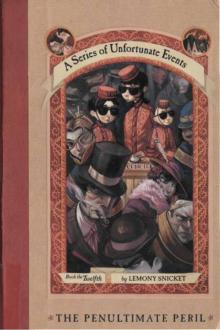 The Penultimate Peril
The Penultimate Peril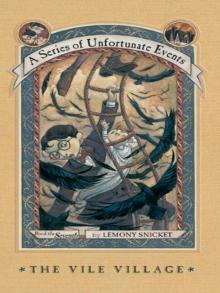 The Vile Village
The Vile Village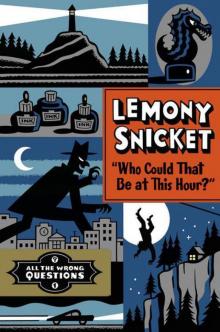 Who Could That Be at This Hour?
Who Could That Be at This Hour?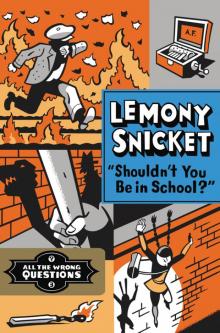 Shouldn't You Be in School?
Shouldn't You Be in School?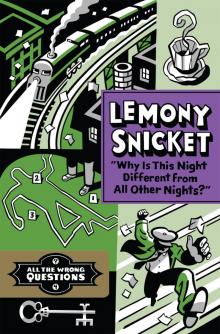 Why Is This Night Different From All Other Nights?
Why Is This Night Different From All Other Nights?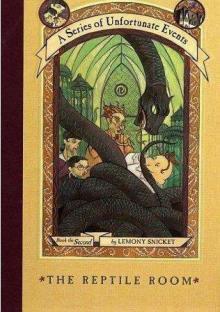 The Reptile Room
The Reptile Room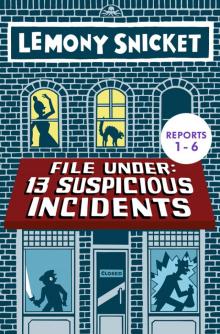 File Under: 13 Suspicious Incidents (1-6)
File Under: 13 Suspicious Incidents (1-6) The End
The End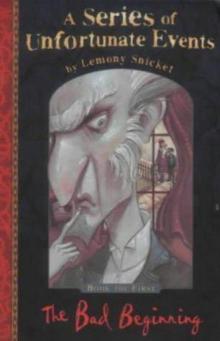 The Bad Beginning
The Bad Beginning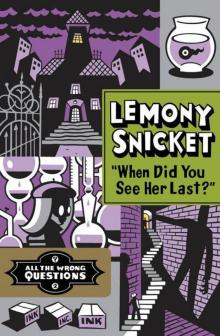 When Did You See Her Last?
When Did You See Her Last?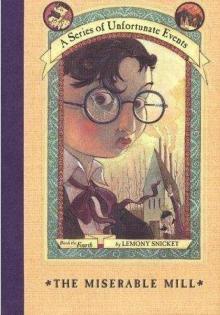 The Miserable Mill
The Miserable Mill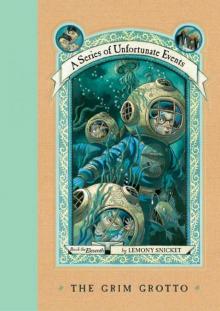 The Grim Grotto
The Grim Grotto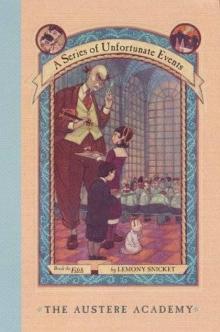 The Austere Academy
The Austere Academy The Ersatz Elevator
The Ersatz Elevator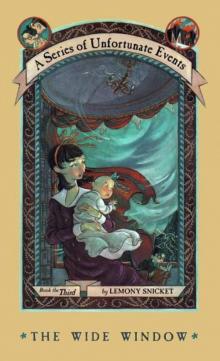 The Wide Window
The Wide Window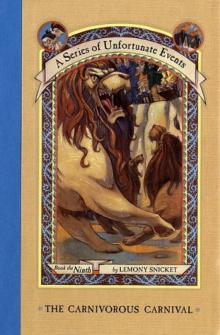 The Carnivorous Carnival
The Carnivorous Carnival A Series of Unfortunate Events Box: The Complete Wreck
A Series of Unfortunate Events Box: The Complete Wreck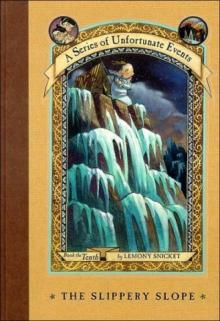 The Slippery Slope
The Slippery Slope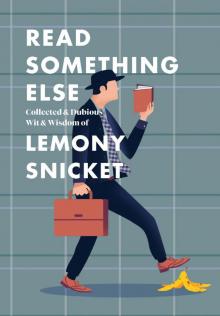 Read Something Else
Read Something Else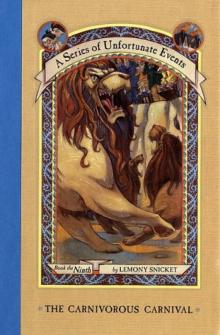 The Carnivorous Carnival asoue-9
The Carnivorous Carnival asoue-9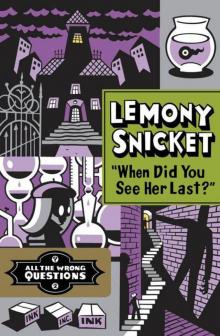 When Did You See Her Last
When Did You See Her Last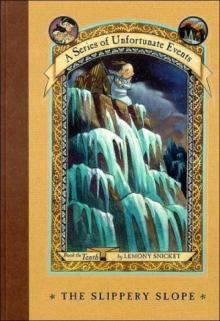 The Slippery Slope asoue-10
The Slippery Slope asoue-10 The Hostile Hospital asoue-8
The Hostile Hospital asoue-8 A Series of Unfortunate Events Collection: Books 1-13 with Bonus Material
A Series of Unfortunate Events Collection: Books 1-13 with Bonus Material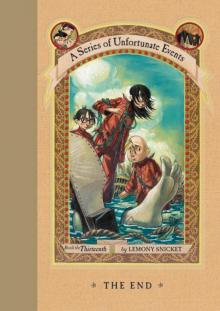 The End asoue-13
The End asoue-13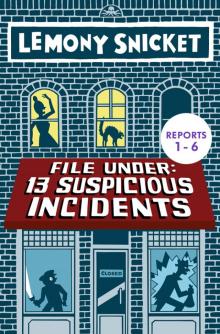 File Under
File Under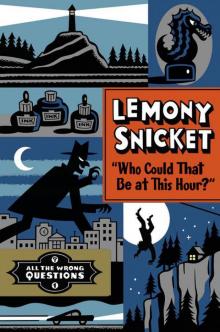 Who Could That Be at This Hour? (All the Wrong Questions)
Who Could That Be at This Hour? (All the Wrong Questions)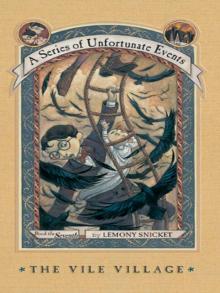 The Vile Village asoue-7
The Vile Village asoue-7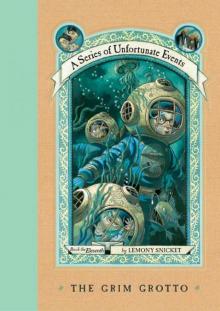 The Grim Grotto asoue-11
The Grim Grotto asoue-11